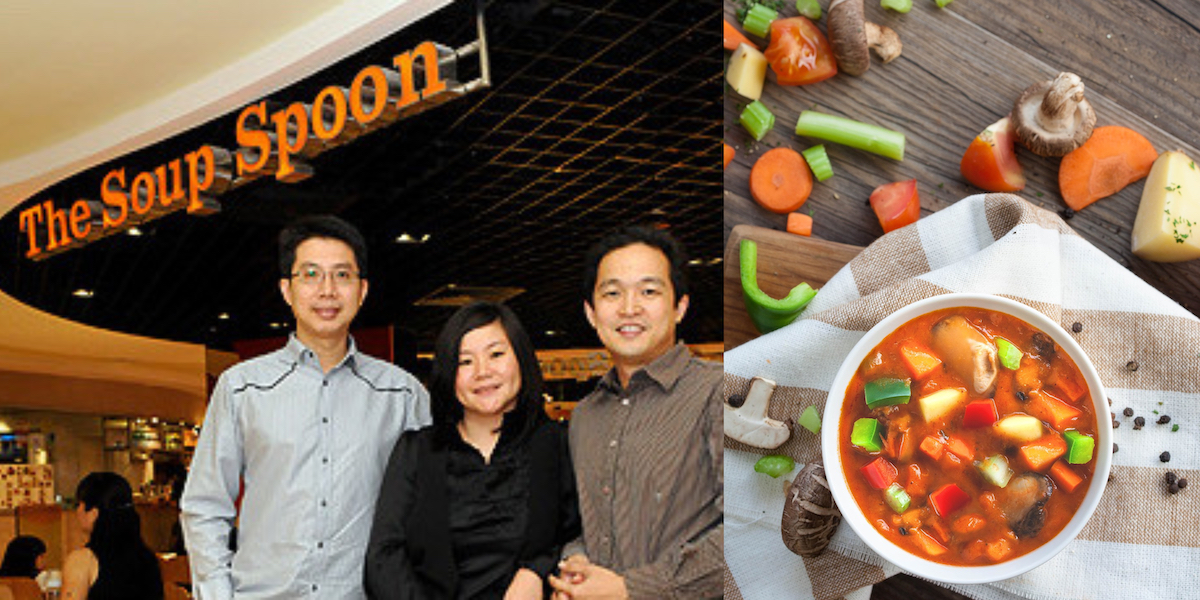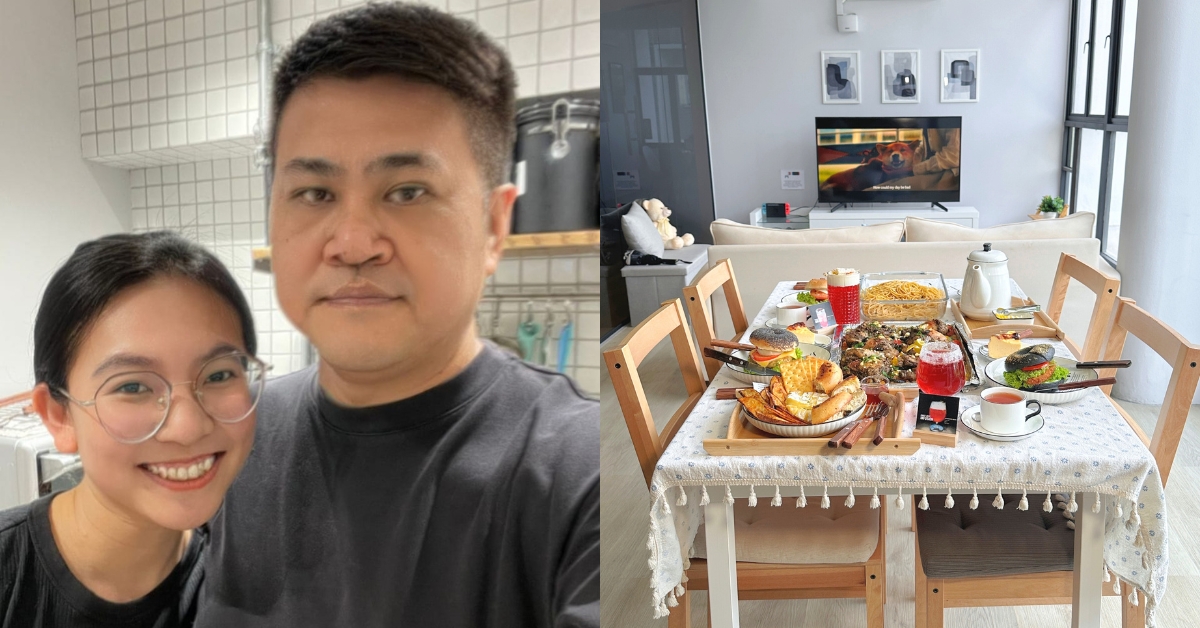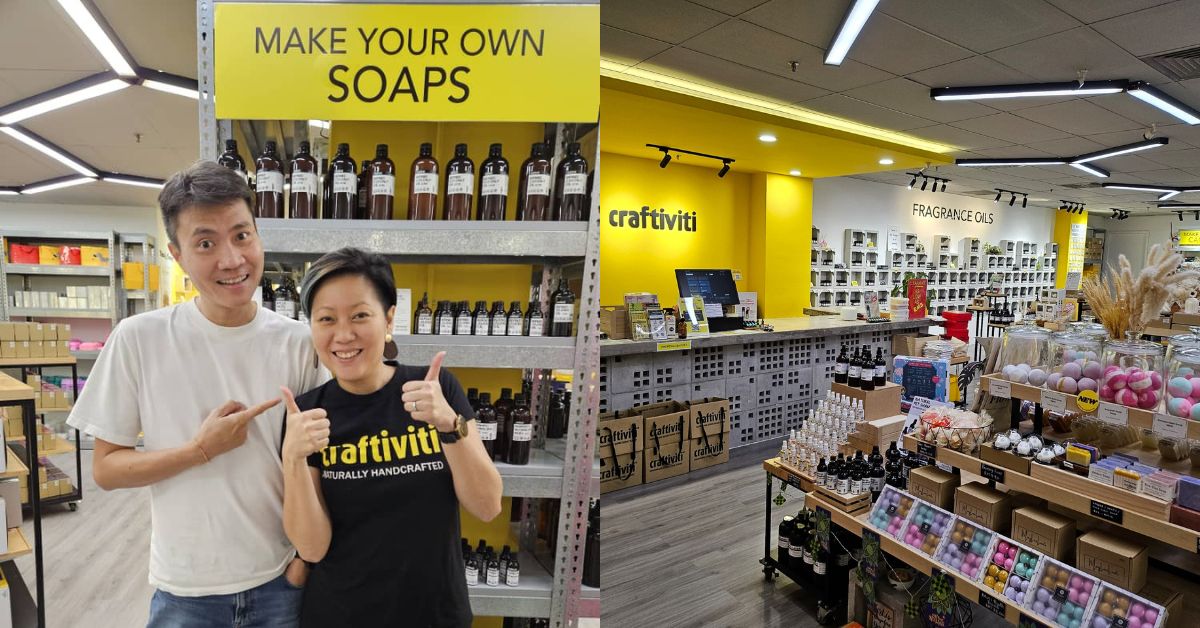No company is more synonymous with the coffee drinking culture than Starbucks.
When you think of a place to get your caffeine fix, you would most likely think of the two-tailed mermaid logo.
Inspired by this, homegrown brand The Soup Spoon aspires to be the “Starbucks of soup”.
They want to fill the gap for healthy soups, and transform the existing soup culture since people typically consume canned soups.
Starbucks is already the biggest coffeehouse chain in the world, but The Soup Spoon is not too far off the track — it’s currently the biggest soup chain in Singapore.
It Started Off As A Home-Based Business
Founders Andrew Chan, Anna Lim and Benedict Leow first met each other when they were pursuing their bachelor’s degree at Murdoch University in Perth.
When Andrew returned to Singapore, he chatted with his sister on the prevalence of soup eateries in England and the United States, which later planted the seed of a business idea among the trio.
Anna married Andrew in early 2001. As an avid cook, she spent most of her free time experimenting with soup recipes while working as an embryologist at the Singapore General Hospital.
A few months after the wedding, she quit her job to set up their own soup business.

Anna takes up the role of a “SouperChef”, where she is responsible for the creation and innovation of soups.
The trio started off selling soup at a church funfair and offered lunchtime delivery services to offices.
They received positive feedback on their soups, but soon realised they needed a proper retail space to cook in large quantities — even washing vegetables in large pots out of a HDB toilet proved to be a challenge.
Invested $250K To Launch ‘The Soup Spoon’
Anna, Andrew and Benedict was aged between 27 and 29 then, making them very young entrepreneurs.
They invested $250,000 to set up the first The Soup Spoon outlet at Raffles City in June 2002, targeting busy professionals who are on the go.

Benedict joined the business three months later, while Andrew came on board full-time only after about a year.
Customer response was so good that they got motivated to open a second outlet.
Within the next few months, it opened another outlet at United Square — but it proved to be a huge failure, closing after just 1.5 years.
[It] was put down to a mix of poor planning and bad luck. We got hit by SARS (severe acute respiratory syndrome). Business dwindled [and] we were at ground zero [as we were] very near to Tan Tock Seng Hospital.
That’s when doubts started creeping in. The team started to question the business plan and whether the brand could actually work out.
They went on to conduct an extensive market research to redefine their target audience.
On hindsight, they felt that they should have focused on the working crowd rather than diversifying too quickly to reach out to families and children who are the main crowd at United Square.
Targeting the latter proved to be a poor choice as parents would drop off their children at the enrichment centres and then leave the mall.
It almost cost us our business. We had to let a lot of people go and two years [later], we [eventually] let go of our United Square outlet to McDonald’s. We lost $100,000.
We also downsized our 2,000 square-feet kitchen to 500 square feet [and] did catering to make ends meet.
Undeterred by this setback, the trio went on to expand their business and open a new outlet at Raffles Place in 2005.
This time, I did my market research. I looked at similar lunchtime concepts and did traffic counts to determine sales. We opened at Raffles Xchange, giving our concept another go.
Learning from the downturn of the Novena outlet, The Soup Spoon started focusing on courting its core customer base of working adults.
It proved to be a strategic location as the area is crowded with health-conscious and time-starved Singaporeans.
In 2008, their sales turnover hit $7.29 million.
Manpower Challenges A Pertinent Problem
While high demand translates to good sales, it is a double-edged sword.
As per the basic law of supply and demand, a shortage will occur when demand exceeds supply.
Their best-selling clam chowder would almost always sold out by evening, so they had difficulty fulfilling customers’ orders.
I was told off by a customer who came three nights in a row after work to “sorry, the clam chowder is sold out”. He told me off — that I have no business running a business if my soups sell out by 7pm.
It served as a harsh “wake-up call” and prompted them to look for a central kitchen to expand their capacity.
However, to balance the equation, they would also need to open more outlets. This also means that they needed to grow their headcount and hire more staff.

Manpower challenges existed 17 years ago, not [just] today. It is a continued struggle for all of us in the industry to find good staff — staff who are passionate and here for the long haul.
In the early days, I would walk into the kitchen after closing at 10pm and be greeted with buckets of unpeeled and uncut potatoes that I would need for tomorrow’s clam chowder. I would stay back to finish the work, thinking ‘what have I gotten myself into’.
But the misery soon ended after the founders met with Swissotel’s Executive Chef Otto who introduced them to a pre-cut vegetable supplier.
Although they needed to fork out more money for it, the trade-off was more than fair.
Outsourcing it meant that they no longer needed to rely on staff to finish the time-consuming work, who can then focus on doing other higher-value tasks.
Now Biggest Soup Chain In Singapore

While The Soup Spoon specialises in soup, they have since expanded their menu to also serve salads, sandwiches, wraps as well as fresh bakes.
To date, The Soup Spoon boasts close to 30 outlets around the office and retail areas in Singapore.
Their latest addition is the new outlet at Harbourfront Centre, which opened early this year.
It has also expanded overseas by opening an outlet in Jakarta in 2009 through a franchisee.
They chose Jakarta because they noticed a large Indonesian clientele at their local outlets, but later terminated the venture when they realised it “was not really the right place for an outlet“.
It has also introduced other food and beverage brands under its umbrella, such as The Grill Knife, The Handburger and The Salad Fork. These brands are collectively called The Soup Spoon Union.
You Can Also Buy Their Soups At Supermarkets

Beyond selling soups at their restaurants, The Soup Spoon has expanded to sell their soups in supermarkets in 2013 as a way to offer convenience.
The Soup Spoon was previously selling chilled soup packs in its outlets, so distributing it to other retailers is just an extension of that business.
We have a lot of customers who came to our stores to order soups for take-away and have them stored at home for next-day consumption. Due to this demand, we have came up with a range of take-home soup packs in stores and supermarkets.
However, one stumbling block they initially faced was not being able to sell these packaged soups to other retailers due to the short two-week shelf life.
By the time they send the packs to retailers and send them to their outlets, there are only seven days left before the expiry date, so retailers refused to carry these products.
The company was also not keen on using preservatives to extend the shelf life as it goes against their philosophy of providing food that is convenient and nutritious.

They ended up investing in a High Pressure Processing machine, which helped increase the shelf life to four months without compromising on the nutrients.
In 2017, The Soup Spoon saw a 30% increase in the sales of its soup packs.
The Soup Spoon’s success has given it the confidence to expand the HPP technology to its ready meals. Compared to a three-day shelf life previously, the ready meals can now last up to 28 days.
“This is a long time for chilled and preservative-free ready meals, which generally expires in less than a week, and gives us a competitive edge in the market,” said Anna.
It also collaborated with other companies to boost the utilisation rate of its machine and equipment.
For instance, the company worked with local fitness centre GymmBoxx in 2017 to increase the shelf life of its protein products.

It also worked with food services firm The Common Good Company to produce healthy, long shelf-life ready meals for local convenience store Cheers.
Capturing The Muslim Market
In 2016, The Soup Spoon launched a ‘halal’ line of take-home soups to capture the Muslim market in Singapore, which represents a big chunk of potential customers.

It also recently attained ‘halal’ certification for its local retail outlets — a move that is seen as belated, considering that it has been around for over a decade now.
The Soup Spoon has received numerous enquiries and feedback encouraging the Group to obtain halal certification for our retail outlets. … We have also seen (such) requests (on) online forums and MUIS’ Twitter.
The demand for us to become Halal is definitely clear [and] we wanted to be inclusive with the rest of the community.
The golden question is, since the F&B market in Singapore is very saturated, what exactly is their secret to success in lasting in this competitive industry?
The biggest secret is to treat the staff and people in the company well. (It’s also important) to continually innovate, as well as adapt to new business models and opportunities.
You need to be agile and alert to changing and disruptive forces surrounding the business.
When asked about their future business plans, the trio said that they are definitely planning to grow and strengthen their international footprint.
Strategic partnerships and fresh funds for investments would be looked into to help us grow, expand and realise our ‘Starbucks of Soup’ dream. We are also developing new products according to the changing needs and demands of our customers.
Featured Image Credit: The Soup Spoon








